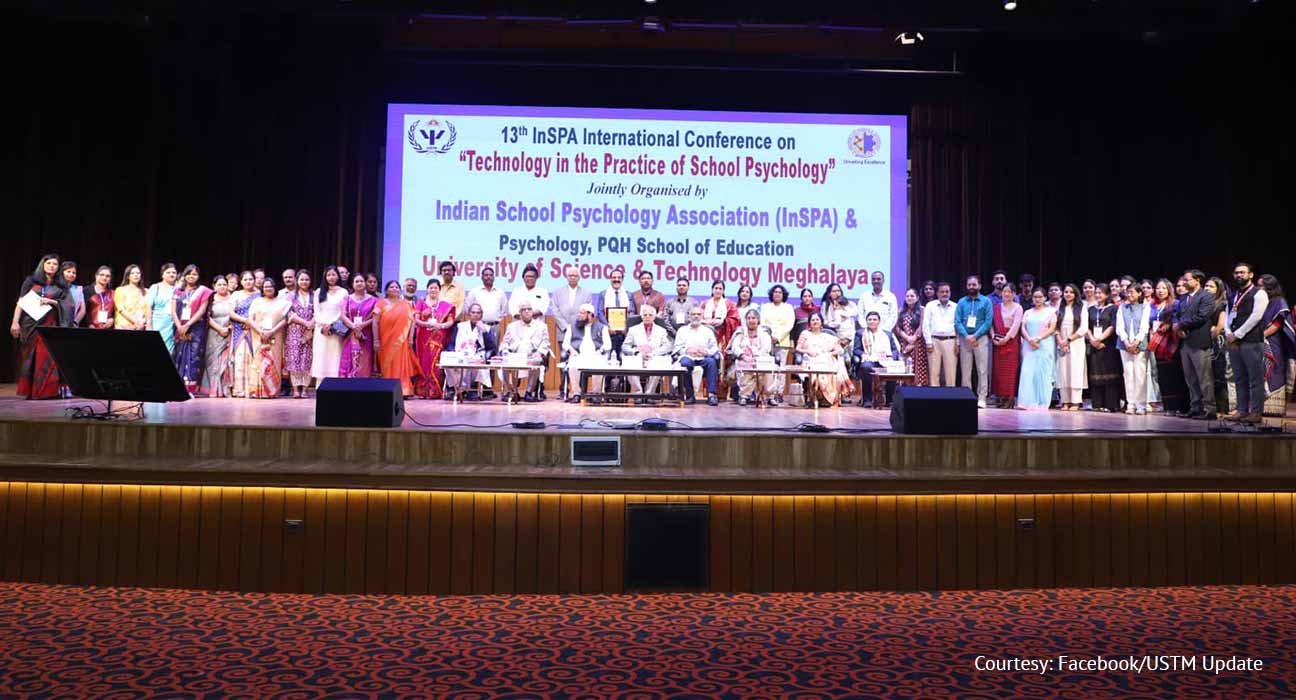To address the issues that educational institutions face, academicians, professors, and scholars of psychology from India and several other nations have all agreed to highlight the need for professional school psychology programmes. They believed that school instruction must include variety in race, culture, community, and religion and that school psychological services can solve problems with useful coping mechanisms by utilizing technological expertise. The Department of Psychology at the PQH School of Education, University of Science and Technology Meghalaya (USTM), has organised the 13th InSPA (Indian School Psychology Association) International Conference on “Technology in the Practise of School Psychology,” which started there lately and runs for three days from 3rd to 5th November 2023. The conference’s first session concluded with a vote of gratitude from Prof. Gayatree Goswamee, dean of the PQH School of Education at USTM.
Need of School Psychology:
India is a developing nation in the Asian subcontinent that is multilingual and multicultural. The educators designed the diverse educational systems to meet the demands of the kids. The state-run schools in India, both in urban and rural areas, are very different from the private English-medium schools that mostly enrol students from well-off families. A variety of factors, such as instructional strategies, physical infrastructure, and administrative regulations, define the existence of schools with varying standards in the Indian context today.
For them to learn and develop new skills and capacities, the students in these schools require appropriate psychological support. Indian schools right now desperately need professional school psychologists to establish a conducive learning environment and deliver the high-quality education the nation so desperately needs.
Indian School Psychology Association (InSPA):
Western conceptions and principles predominate in academic psychology in India. Therefore, it is fairly feasible to train graduates in school psychology to provide a solid foundation for the teaching and learning process in the classroom. It takes both knowledge and abilities to be competent. Programmes in school psychology make sure that applicants have a solid understanding of psychology and education, covering theories, models, research findings, and methods in each area.
As per the National Association of School Psychologists (2000), training programmes in school psychology make sure that applicants have the professional abilities required to provide efficient services that yield favourable results in every area of practice.
With over 1,300 members, InSPA is a voluntary, non-profit organisation that provides school psychological services. To address the demands of society, the Association’s main goal is to advance value-based education and training by developing school psychology as a subdiscipline. The Asia Pacific School Psychology Association (APSPA), based in Malaysia, and the International School Psychology Association (ISPA), based in the United States, associate with it. On August 15, 2009, the Pondicherry Association was founded to start the process.
Glimpse of International Conference:
In addition to participants and experts in the field from India, Japan, Mauritius, Thailand, and Malaysia, the conference’s inaugural session, which was held in a blended mode, was graced by Professor Kiran Devendra, Head of the Department of Elementary Education at NCERT, New Delhi; Dr Ariz Ahammed, IAS, Principal Secretary, Government of Assam; Prof. Panch. Ramalingam, Director in Charge of UGC-MMTTC, Pondicherry University & President at InSPA; Dr. D. Rajendran, Secretary, InSPA; Prof. Narsinghen Hambyrajen, Professor of Law, University of Mauritius (online); and Shri M Hoque, Chancellor USTM.
“Facts form the foundation of science, just as rocks form a house, but a body of facts is not a science any more than a group of rocks constitutes a home,” is the conference’s subject. Along with three other books, “School Psychology,” “School Psychology (Assamese version),” and “InSPA Journal of Applied and School Psychology,” the delegates also unveiled the “Book of Abstracts.”
InSPA has given seven annual awards during the conference to support school psychology in India and to recognise the accomplishments and noble efforts of individuals or institutions. Dr Ariz Ahammad, Government of Assam, IAS, Principal Secretary, Assam; Prof. Devendra K. Choudhry received the Shrimati and Smt. P. A. Sharma Excellence Award for outstanding services in the country’s school education system. Dr Sushma Yadav, Pro Vice-Chancellor of Central University of Haryana (CUH), Mahendergarh, received the InSPA School Psychology Award; Prof. Anand Kumar, a psychology professor at Mahatma Gandhi Kashi Vidyapith, Varanasi, received the Prof. G.P. Thakur Memorial Award for Outstanding Leadership; and Dr. Jerina Begum, USTM, received the InSPA P. K. Subbaraja Trust Best Performance Award; Prof. Rajendra Singh of the Government SDJH Medical College and Hospital in Chandeswar, Azamgarh, Uttar Pradesh, was awarded the Dr. D. Rajendran Best School Counsellor Award.













Leave feedback about this